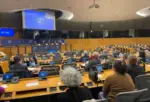Global priorities under the next U.S. administration, led by President Donald Trump, may leave the Balkans without the necessary attention. Experts on developments argue that a more proactive policy is essential to resolve the current deadlock in the Brussels-mediated dialogue and ensure the strengthening of territorial integrity in the Balkan states.
A policy that avoids questioning territorial borders and improves relations between Kosovo and the U.S. is what the new leadership in the respective countries should aim for, according to analysts. While the inauguration of President Trump is expected in January, Kosovo will hold general elections a month later, after which a new government will be formed. So far, Trump has appointed several figures to various positions but has not yet named a special envoy for the Kosovo-Serbia dialogue.
Balkan expert Daniel Serwer states that more important than the name of the special envoy is the policy Trump will implement regarding Kosovo and the Western Balkans. According to him, the Balkans may not receive the necessary attention due to developments in other parts of the world.
“I believe there should be a clear policy before a special envoy is appointed. And I would like to see what that policy is. If the policy is partition, I don’t want to see a special envoy. If the policy is strengthening sovereignty and territorial integrity of all Western Balkan countries, this is a policy that I think could use a special envoy. So the policy needs to come first. The special envoy is the personal representation of that policy. And I don’t think you should have a special envoy if you don’t have a policy,” said Serwer.
Referring to the history of relations between the Kurti 1 government and Trump’s former special envoy for the Kosovo-Serbia dialogue, Serwer says that Kosovo should engage for better relations not only with the U.S. but also with the EU.
“I think it’s scandalous that EU sanctions are still in place, and, you know, they’re not at the core of the issue, and everyone understands that now they are being kept because one or two countries in the EU don’t want to lift the sanctions. I think relations with Europe can be improved. But beyond that, relations can and should be improved with the United States. But you know, it takes two to tango, and Americans need to do this, which I think they’ve had a wrong approach regarding the dialogue. The appeasement towards Serbia is a policy that Americans should move away from.”
The American analyst has criticized the current policies of the Biden administration and the EU in the Balkans. According to him, the policy of appeasement towards Serbia has not yielded the desired results. Serwer suggested that a better policy would be the reinforcement of sovereignty and territorial integrity of all the states in the Balkans, including Kosovo.
Incoming President Trump has already appointed Secretary of State Marco Rubio and Richard Grenell as representatives for “special missions.”
According to analyst Demush Shasha, these two positions are bound to conflict with each other, and the consequences will be felt in the Balkans.
“Grenell will certainly continue to deal with Kosovo and Serbia. He will do this parallel and in tension with the natural diplomatic process led by the State Department. Also, he has already shown that he has fundamentally different views from Prime Minister Kurti on the Kosovo-Serbia dialogue. It is hard to imagine how Kurti and Grenell will not end up on a collision course in 2025. And this relationship will definitely stir up the political scene in Kosovo. But many say that Trump’s second presidency might surprise us for the better. Maybe it will,” Shasha wrote in an opinion for Koha Ditore.
The dialogue between Kosovo and Serbia, mediated by the EU, began in 2011 in Brussels, with continued support from the U.S. During Trump’s first presidency, a special envoy was appointed for the Kosovo-Serbia dialogue. Under Richard Grenell’s mediation, on February 4, 2020, Kosovo and Serbia signed the so-called economic normalization agreement. This agreement, which also included the recognition of Kosovo’s independence by Israel, has not been fully implemented.
With the arrival of President Joe Biden, U.S. involvement in the Kosovo-Serbia dialogue has only been through the Special Envoy for the Western Balkans, Gabriel Escobar.
In Brussels, Kosovo and Serbia reached an agreement on the path to normalizing their relations on March 18, 2023, in Ohrid. Although the agreement was not signed, the European Union, which mediates the dialogue between Kosovo and Serbia, insists that it is binding for both parties.
The 11-point agreement reached in Ohrid on March 18, 2023, among other things, provides for a level of self-management for the Serbian community in Kosovo, mutual recognition of state symbols, and for Serbia not to block Kosovo’s membership in international organizations. It also calls on both Pristina and Belgrade to implement all previous agreements reached during the dialogue.







